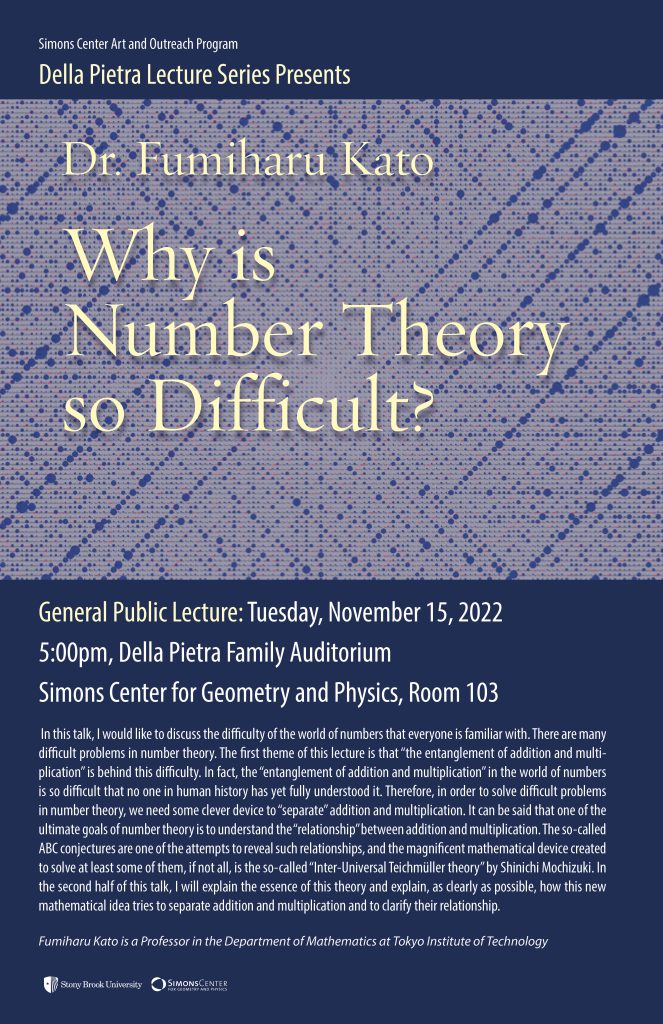General Public Lecture
Date and Time: Tuesday, November 15, 2022, 5:00PM ET
Location: Della Pietra Family Auditorium – 103
Reception at 4:15pm, Simons Center Lobby
Abstract: In this talk, I would like to discuss the difficulty of the world of numbers that everyone is familiar with. There are many difficult problems in number theory. The first theme of this lecture is that “the entanglement of addition and multiplication” is behind this difficulty. In fact, the “entanglement of addition and multiplication” in the world of numbers is so difficult that no one in human history has yet fully understood it. Therefore, in order to solve difficult problems in number theory, we need some clever device to “separate” addition and multiplication. It can be said that one of the ultimate goals of number theory is to understand the “relationship” between addition and multiplication. The so-called ABC conjectures are one of the attempts to reveal such relationships, and the magnificent mathematical device created to solve at least some of them, if not all, is the so-called “Inter-Universal Teichmüller theory” by Shinichi Mochizuki. In the second half of this talk, I will explain the essence of this theory and explain, as clearly as possible, how this new mathematical idea tries to separate addition and multiplication and to clarify their relationship.
Special Talk for High School Students
Date and Time: Wednesday, November 16, 2022, 11:00AM ET
Location: Della Pietra Family Auditorium – 103
Title: Neverending Numbers That Continue to the Sky
Abstract: The story begins with a mysterious “number” that is not normally possible, “a number with infinite digits that does not change even if it is squared.” Such “numbers” do exist, but in order to accept them, we have to break down some common sense about “numbers.” However, if we accept it, the vast, free and deep world of mathematics lies beyond. The world of numbers you can find there is not the world of “ordinary” numbers such as real numbers and complex numbers, but the so-called “non-archimedean” world of numbers. The world of such numbers was discovered by German mathematician Kurt Hensel around the year 1900. Since then, this number system called “p-adic numbers” has become an indispensable and important part of modern mathematics. This talk starts with the naive idea of “numbers with infinite digits” and invites you down the natural path to “p-adic numbers”.
Technical Talk for Faculty and Advanced Graduate Students
Date and Time: Thursday November 17, 2022, 4:30pm ET
Location: Della Pietra Family Auditorium – 103
Title: Non-archimedean geometry — Past and Present —
Abstract: In this talk I will give a non-professional introduction to non-archimedean geometry in general, including rigid geometry, Berkovich geometry, etc., as well as some applications and current trends. We first discuss rigid geometry, as closely as possible to its historical order, and try to make it clear that, although one has to use several fancy looking machinery such as Grothendieck topology, it is actually based on a natural way of thinking. In non-archimedean geometry, the question of how to set up the concept of points is one of the most important points to discuss. Based on this, we discuss Berkovich geometry and the birational approach by Fujiwara and myself. The talk ends with some applications, including my latest contributions.


